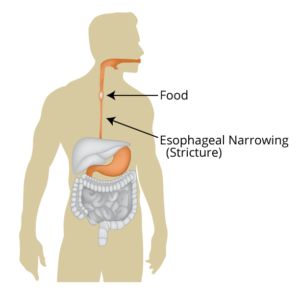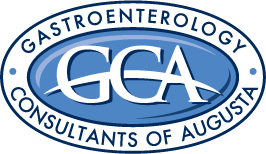Dysphagia

The normal esophagus is elastic and will relax to allow passage of food. Even food particles as large as 2cm will often pass without difficulty. If a segment of the esophagus losses its elasticity, larger non-compressible food particles will stop within the esophagus. When food stops, it may trigger potent painful contractions of the esophagus in an attempt to push the particle past the point of narrowing. Some patients may experience muscular spasms that prevent food passing through the esophagus to the stomach. The sensation that food or liquid has stopped is referred to as dysphagia.
Many confuse blockage of the airway with dysphagia. The Heimlich maneuver is helpful in clearing a blockage of the airway but will do little when food lodges in the esophagus. Blockage of the esophagus typically causes swallowing problems, but not inability to breathe or talk.
Symptoms
Dysphagia is usually associated with these symptoms:
- Pain while swallowing
- Inability to swallow
- Regurgitation
- Frequent heartburn
- Drooling
- Coughing or gagging while swallowing
- Feeling as though food is stuck in throat or chest
- Loss of appetite or weight
Causes
Difficulty swallowing can be categorized as
- Structural problems where the esophagus is narrowed or compromised, or
- Neuromuscular, where the nerve or muscle of the esophagus does not work properly.
The most common causes of dysphagia are
- Neurological damage, such as from stroke or brain injury
- Neurological disorders such as Parkinson’s disease, multiple sclerosis, muscular dystrophy or ALS
- Heartburn or GERD
- Radiation therapy
- Autoimmune disorders such as scleroderma or lupus
- Esophagitis (inflammation of the esophagus from acid, ingestion, pill related injury, or radiation)
- Diverticula of the esophagus or pharynx
- Allergic processes like Eosinophilic esophagitis
Cancers of the esophagus or adjacent organs
Diagnosis
Dysphagia is considered an alarm symptom and requires evaluation. Your doctor can arrive at a diagnosis by:
- Taking a medical history
- Performing a physical exam
- Performing diagnostic tests, such as a barium swallow, motility testing and endoscopy
Treatment
A treatment plan for dysphagia depends on the cause and severity of the condition. Your doctor may recommend
- Dietary modifications—to make food easier to swallow
- Medication—to relax esophagus or treat underlying causes of dysphagia
- Esophageal dilation—a endoscope procedure that gently stretches your esophagus
- Exercises to strengthen muscles and improve swallowing
In some advanced cases, surgery or tube feeding may be required.
If are having difficulty swallowing, our office can help. Call (706) 868-0104 for more information.
The content on our website is for informational purposes only, and is not intended to diagnose or treat any medical conditions. Always seek the advice of your physician with any questions you may have regarding your health.
